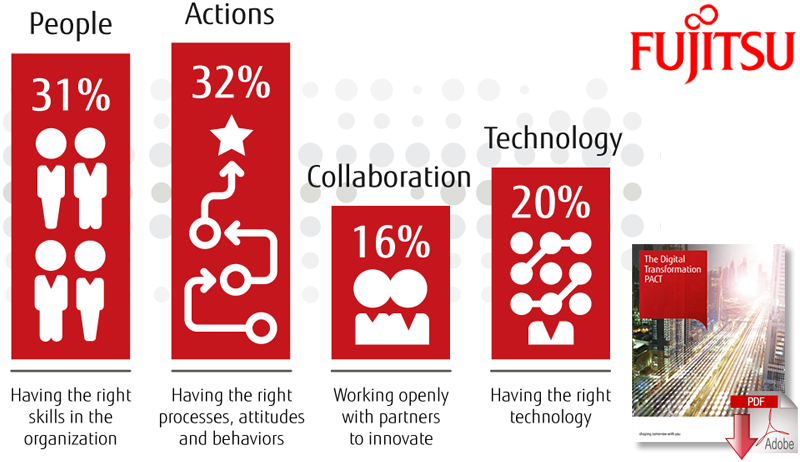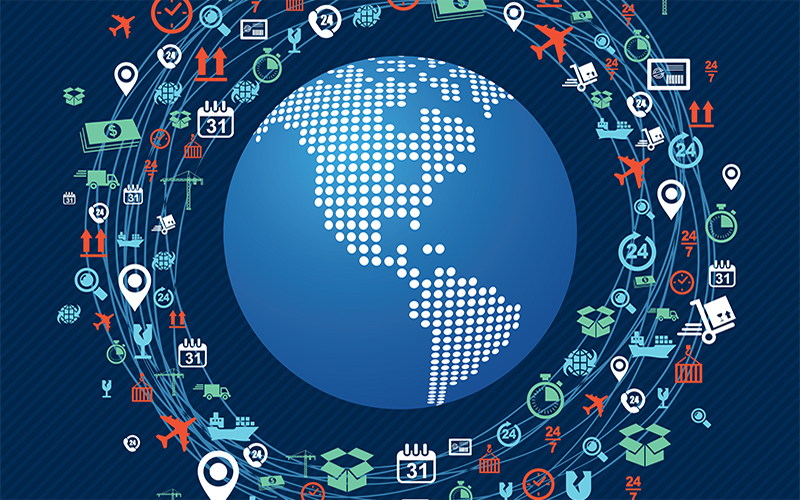Supply Chains Struggle to Deliver Digital Promises

According to a recent Fujitsu study, businesses understand the transformative power of technology but are struggling to keep the four strategic elements required to digitally transform: people, actions, collaboration and technology (PACT).
Technology is truly transformative, and in the last few years, we’ve seen the digital pace of change increase significantly.
Digital is now a fundamental part of our lives, both as consumers and on the whole as workers.
We’re beginning to realize the potential of technologies like artificial intelligence and the Internet of Things, to change industries and even society as a whole.
And critically, businesses around the world are taking note.
Adopting and adapting to technology is no longer a nice to have; in the era of digital disruption, it’s a necessity.
But for today’s organizations' successful digital transformation is about much more than technology alone.
To realize their digital vision, it’s crucial that businesses also have the right skills, processes, and partnerships in place.
With that in mind, we set out to explore how well businesses really are approaching digital transformation – and any pitfalls they are facing.
We approached over 1,600 business leaders worldwide to assess their performance against the four strategic elements required for successful digital transformation: People, Actions, Collaboration, and Technology – PACT.
And what we found is that although globally businesses recognize the importance of digital transformation, organizations are struggling to balance the elements needed to deliver on digital.
The majority of businesses have already undertaken digital transformation projects, which are either in progress (29%) or have already delivered outcomes (46%).
However, while the digital transformation is being undertaken, the path is far from smooth.
One in four business leaders (28%) has experienced a failed project in the last two years, costing €555,000 on average, that's approximately £500,000 or $660,000. Crucially, 84 percent of businesses say that their customers expect them to be more digital, and 71 percent believe that they are behind their competitors.
These difficulties reflect businesses’ challenges with the four strategic pillars relating to digital transformation. For example, technology will be limited in its impact without the skills and expertise to make it work.
But when considering their approach to people, 70 percent of global leaders admit there is a clear lack of digital skills within their organization, while 80 percent say that a lack of skills is the biggest hindrance to addressing cybersecurity.
Looking at actions, meaning the processes and behaviors needed to make digital transformation work, also throws up concerns.
“Technology can be truly transformative, but making the most of digital requires more than the latest tools. While businesses today recognize the need to adopt and adapt to technology, there remain significant issues that are contributing to substantial rates of failure and high associated costs. To realize their digital vision, it’s crucial that businesses have the right skills, processes, partnerships, and technology in place. With digital disruption rapidly changing the business landscape, businesses can’t afford to fail in their transformation.” Duncan Tait, CEO, SEVP and head of Americas and EMEIA at Fujitsu
Although nine in ten business leaders (90%) say their organization has a clearly defined digital strategy, three quarters (74%) say that projects are often undertaken that aren’t linked to the overarching business strategy.
Collaboration, and specifically co-creation are also vital to thriving in our digitally disrupted world. But while most businesses (63%) are undertaking or planning to undertake co-creation projects, 73 percent say that a lack of success within a quick timeframe would quickly put an end to their strategic partnerships.
When it comes to the technology itself, it’s positive to see that businesses are aware of the disruptive impact of change, with 86 percent of leaders agreeing that the ability to change will be vital to their survival in the next five years.
As a result, many businesses are planning to introduce cybersecurity solutions (52%), the Internet of Things (51%) and artificial intelligence (46%). However, 71 percent remain concerned about their organization’s ability to adapt to digital technologies like artificial intelligence (AI).
Digital disruption is a powerful force – and business leaders are adapting, introducing new technologies and evolving their organizations. But while the introduction of new technology has always called for a sense of balance, right now that balance has never been more important.
It’s only by bringing equilibrium to the four vital elements of the digital pact – People, Actions, Collaboration, and Technology – that businesses can truly transform and thrive in the digital age.
About the Author
Duncan Tait is Fujitsu’s Director and Corporate Executive Officer EVP, Head of EMEIA and the Americas. Duncan has more than 27 years’ experience in the ICT industry. During this time, he has led businesses across the broad spectrum of technology and services, in the UK and internationally. His deep business and industry knowledge and global perspective are critical assets that enable Fujitsu to achieve its mission: to use technology to improve global business and society.
Related: The Supply Chain Digital Age Requires New Restructuring Initiatives
Article Topics
Fujitsu News & Resources
Supply Chains Struggle to Deliver Digital Promises The Digital Transformation PACTLatest in Technology
Spotlight Startup: Cart.com is Reimagining Logistics Walmart and Swisslog Expand Partnership with New Texas Facility Taking Stock of Today’s Robotics Market and What the Future Holds Biden Gives Samsung $6.4 Billion For Texas Semiconductor Plants Apple Overtaken as World’s Largest Phone Seller Walmart Unleashes Autonomous Lift Trucks at Four High-Tech DCs Talking Supply Chain: Procurement and the AI revolution More Technology















